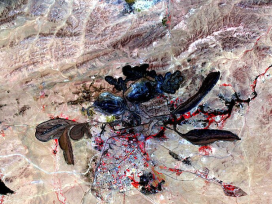‘Revue Projet’ asks what ecology has done to politics. Including: interview with Amy Dahan on ineffectual global governance around climate change; primer on climate activists and civil disobedience; and insider comment on what’s ailing the French government’s policy on climate.
Dahan identifies a ‘schism in reality’ that marks efforts to fight climate change: on the one hand, negotiations are conducted ‘in a bubble, governed by the UN rules of consensus and civility, built around notions such as responsibility, equity and the sharing of burdens,’ she says; on the other, there’s a scramble for resources, ‘unbridled competition between countries’ and the ‘spread of the Western way of life, which only exacerbates the climate problem.’
COP21 ‘marks the moment when climate became a truly global issue,’ when more and more stakeholders pronounced themselves ‘concerned’, says Dahan. Tough questions demand not only answers but also action. And yet ‘the system hasn’t changed,’ she concludes.

Disobedient youth
Christian Mellon discusses the tactics young people use when protesting against the French government’s ‘inertia in the fight against climate change’. Looking for clarity in what they want to achieve, he asks: ‘Is this a refusal of politics or a new form of civic engagement?’ He questions whether this ‘craze for civil disobedience’ doesn’t ‘reinforce’ a lack of interest in politics.
In response, Mellon unpacks what counts as ‘politics’: a political commitment to the common wellbeing, he suggests, should not be conflated with ‘how politics works today’. Yet in support of youth action, citing Rawls’s definition of civil disobedience, he also proposes that far from subscribing to any ‘anarchist ideology’, activists want to change public policies that ‘offer a very inadequate response to the challenges facing the future of the planet.’
Ministry of the impossible
Coline Perran (pseudonym) describes the environmental policies of successive French governments as ‘sclerotic’, calling on current leaders to embed an environmental focus in everything parliament does.
France’s former Minister for Ecology, Nicolas Hulot, remarked in his resignation announcement that he was ‘alone at the helm’. This isolation might suggest an impoverished system with shrinking budgets. However, as Perran states, ‘the powers of the ministers of ecology have been broadened’. The picture is rife with contradictions: large budgets subsist alongside ineffectual policies.
Perran points out that the state can act decisively when events force it to do so. The Council of State fined the government 10 million euros ‘for not having taken sufficient measures to combat air pollution,’ for example. When the pressure is on, the government can do much better, thinks Perran, choosing ‘to use its prerogatives and put certain issues ahead of sectoral and economic considerations.’
This article is part of the 9/2021 Eurozine review. Click here to subscribe to our weekly newsletter to get updates on reviews and our latest publishing.
Published 26 May 2021
Original in English
First published by Eurozine
© Eurozine
PDF/PRINTPublished in
In collaboration with
Newsletter
Subscribe to know what’s worth thinking about.
Related Articles

Literary expressions of grief across the ages use representations of nature as soothing metaphors. But rarely does the death of non-human life merit a thanatography. Could literature that finds a non-anthropomorphic means to grieve for other sentiment beings provide our desperately needed resensitization to the natural world?

Property development pushed on green space in Bucharest has become comparable with the drugs market for profitability. Investigating the trail of questionable ownership rights since post-communist retrocession reveals acts of corruption and intimidation. Can parkland – a prerequisite for urban health and well-being, climate-change reduction and biodiversity – be saved from more illegal fires?









